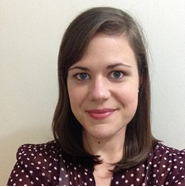Congratulations to Victoria Ameral on being selected as the Student Spotlight Award winner for March 2017!
The purpose of this award is to highlight students who are doing important work in the CBS community whether for research, clinical, and/or volunteer-humanitarian efforts. This will be a way to highlight their achievements, let the ACBS community know important work students are doing, and possibly provide a platform for mentoring/collaboration/professional development/conversations around highlighted areas.
Learn more about Victoria:
Background of CBS Research/Clinical/Volunteering efforts/achievements:
I began my clinical training in ACT as a second year graduate student, and now, as a fifth year, I am an advanced peer supervisor for second year students in Clark University’s ACT practicum. ACT and RFT have influenced all of my independent research endeavors as a graduate student. My master’s thesis evaluated the differential impact of negative and positive reinforcement processes on quality of life in depression. In addition to using this general measure of functioning, I also tested the model in a mixed sample to evaluate its impact across the well-being continuum. My dissertation research, for which I received a student research grant from APA Division 50, is an experimental test of values clarification in opioid use disorder. I am investigating whether a brief values clarification exercise increases motivation for abstinence, and whether it does so by improving the ability to delay gratification.
I also consider my personal outreach efforts to be a sort of CBS volunteer effort. While working as a full time research assistant at Massachusetts General Hospital, I made a number of friends who are now training in second wave CBT programs. I very much enjoy engaging in active discussions with them around the differences between ACT and CBT. I think these conversations can be a powerful tool for making ACT accessible to those who did not receive third-wave training as graduate students.
Autobiography:
I am a fifth year doctoral candidate in clinical psychology at Clark University, where I work with Dr. Kathleen Palm Reed. I graduated summa cum laude from the University of Massachusetts, Amherst in 2008, where I completed my honors thesis in cognitive neuroscience. I then spent four years as a research assistant at Massachusetts General Hospital prior to starting graduate school.
As a result of my undergraduate and post-baccalaureate experiences, I am drawn to research and clinical approaches that address the limitations of our diagnostic system, and bridge the gap with related fields such as neuroscience. I became interested in substance use disorders through my clinical work, and over the past 2+ years have continued to work with this population. I am passionate about supporting individuals with substance use disorders to rebuild a valued life, a focus which inherently rejects the notion that addiction is the result of some moral failing. Addiction research has also long highlighted the role of reinforcement in substance use disorders, and I am excited by the potential links between reinforcement processes and values work.
In addition to this focus on substance use disorders, I have a broader interest in work that improves the lives of stigmatized groups, including victims of interpersonal violence and sexual and gender minority individuals. At the end of my career, I hope to be described as an affirming and respectful clinical scientist who was passionate about my work.
Future goals:
I aim to build a clinical research career bridging the gap between clinical science and practice in the treatment of substance use disorders, with a particular focus on processes related to values and motivation.
